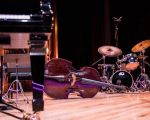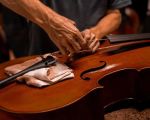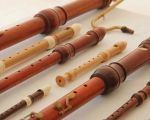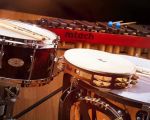Best Portable Keyboards for Practice: Top Picks for Musicians
Apr 20, 2025
Choosing the Best Portable Keyboards for Practice
If you’re anything like me, you know that finding the right keyboard can be a game-changer for your practice routine. Over the years, I’ve learned that having a portable, reliable, and high-quality keyboard makes all the difference when it comes to improving my playing skills. Whether you’re just starting out or an experienced musician, a portable keyboard offers flexibility, convenience, and the freedom to practice wherever you go.
Why a Portable Keyboard is Ideal for Practice
The idea of practicing anywhere, at any time, was something that really drew me to portable keyboards. Unlike traditional pianos, portable keyboards can be easily transported from room to room, and even taken to gigs or lessons. This convenience has been invaluable to me, especially as a busy musician balancing practice sessions with work and travel.
But it’s not just the portability that makes these keyboards so great for practice. They’re packed with features that help you develop your skills more effectively. With a variety of sounds, learning modes, and recording features, these keyboards allow you to experiment with different styles, improve your technique, and track your progress.
What to Look for in a Portable Keyboard
Choosing the right portable keyboard for practice can be overwhelming given the many options available. From my own experience, here are the key factors to consider when making a purchase:
1. Key Feel and Action
The feel of the keys is a crucial element when selecting a keyboard. As a beginner, I was initially attracted to keyboards with a lot of sounds and flashy features. But I quickly realized that key feel and action are just as important for practice, especially if you’re looking to eventually transition to a full-sized piano.
There are two main types of key actions you should look for:
Weighted Keys: These simulate the feel of a traditional piano, offering a more authentic playing experience. If you plan to eventually upgrade to a grand piano, a keyboard with weighted keys will make the transition smoother.
Non-weighted Keys: These are typically lighter and easier to play, making them a good choice for beginners or anyone looking for a keyboard that’s more portable and less expensive.
I started with a non-weighted keyboard and found it perfect for light practice. But over time, I upgraded to a model with weighted keys, and the difference was remarkable when it came to building finger strength and technique.
2. Portability and Size
Portability is, of course, one of the main reasons to choose a portable keyboard. I needed something I could easily take with me when traveling or visiting friends. Generally, portable keyboards come in different sizes, ranging from 61 keys to 88 keys.
For beginners or casual players, a 61-key keyboard offers plenty of room for learning songs and practicing scales. However, if you’re more serious about your playing or want to practice complex pieces, I’d recommend looking at 76 or 88-key keyboards, which provide a full range of notes similar to an acoustic piano.
Since I travel a lot, I opted for a compact 61-key keyboard at first. It was lightweight, fit easily in my car, and allowed me to practice on the go. Once I began to play more advanced pieces, I upgraded to a larger model, but the portability of the smaller keyboards remains one of my favorite features.
3. Built-in Learning Features
One of the reasons I love portable keyboards is the built-in learning tools. These features make it easier for beginners to learn the ropes and for advanced players to improve their skills. I used several of these learning modes when I was starting out.
Look for keyboards that offer:
Light-up Keys: This feature guides you to the correct notes, helping you learn songs quickly.
Learning Modes: Some keyboards have a "lesson" mode that breaks down songs into smaller segments to make learning easier.
Recording Functions: Being able to record yourself and listen back was a game-changer for me. It helped me identify areas where I could improve.
These tools made practicing much more enjoyable and less frustrating. They were like having a virtual piano teacher right in my living room.
4. Sound Quality and Variety
Sound quality is a major consideration. Most portable keyboards come with a range of sounds, from piano to strings to electronic synths. While the piano sound is usually the most important to me, having access to different sounds has been great for exploring different musical styles and genres.
The sound quality is also important when recording or playing in different settings. A keyboard with good speakers and sound engines can make a huge difference in how your practice session feels. Some models also allow you to connect external speakers for improved sound.
Top Portable Keyboards for Practice
Now that you know what to look for, let me share some of my favorite portable keyboards that I’ve personally tried and would recommend to any musician, especially those just getting started.
1. Yamaha PSS-F30 Portable Keyboard
The Yamaha PSS-F30 is a fantastic entry-level keyboard. It’s compact, affordable, and comes with a wide variety of sounds and learning tools. The 61 keys are easy to navigate, and the lightweight design makes it perfect for travel. It also features built-in lessons and a sound library that covers everything from pianos to drum kits.
I loved this keyboard when I was first starting out. It made learning fun and the portability allowed me to practice whenever I had a free moment.
2. Casio Privia PX-160 Digital Piano
For those looking for a more authentic piano experience, the Casio Privia PX-160 is a solid choice. It features weighted keys that replicate the feel of an acoustic piano, making it great for building finger strength and technique. The sound is incredibly realistic, and it comes with built-in learning tools to help beginners get started.
The portability of the Casio Privia PX-160 made it easy for me to move it around for gigs or practice sessions. Despite its larger size compared to other models, it’s still relatively lightweight, which is a big plus.
3. Roland GO:KEYS 61-key Portable Keyboard
If you want a keyboard that combines portability, sound variety, and creativity, the Roland GO:KEYS 61-key portable keyboard is a great choice. It offers a range of sounds, from pianos to synths, and its Bluetooth connectivity allows you to connect to music apps and learn more effectively.
I’ve used this keyboard for both practice and recording. The ability to integrate with apps like GarageBand made it even more fun to experiment with new sounds.
4. Korg B1 Digital Piano
The Korg B1 is an excellent option for those who want a portable keyboard with a rich, authentic piano feel. It has weighted keys, which are perfect for practicing more serious pieces, and the sound quality is top-notch. It’s a little heavier than other portable options, but the sound and feel make it worth the extra weight.
Conclusion
When selecting the best portable keyboard for practice, it's important to think about your specific needs, such as key feel, portability, sound quality, and learning tools. The right keyboard can make your practice sessions more enjoyable and efficient, and it’s a great way to improve your skills wherever you go. Whether you're a beginner or an experienced player, the right portable keyboard will help you achieve your musical goals.







